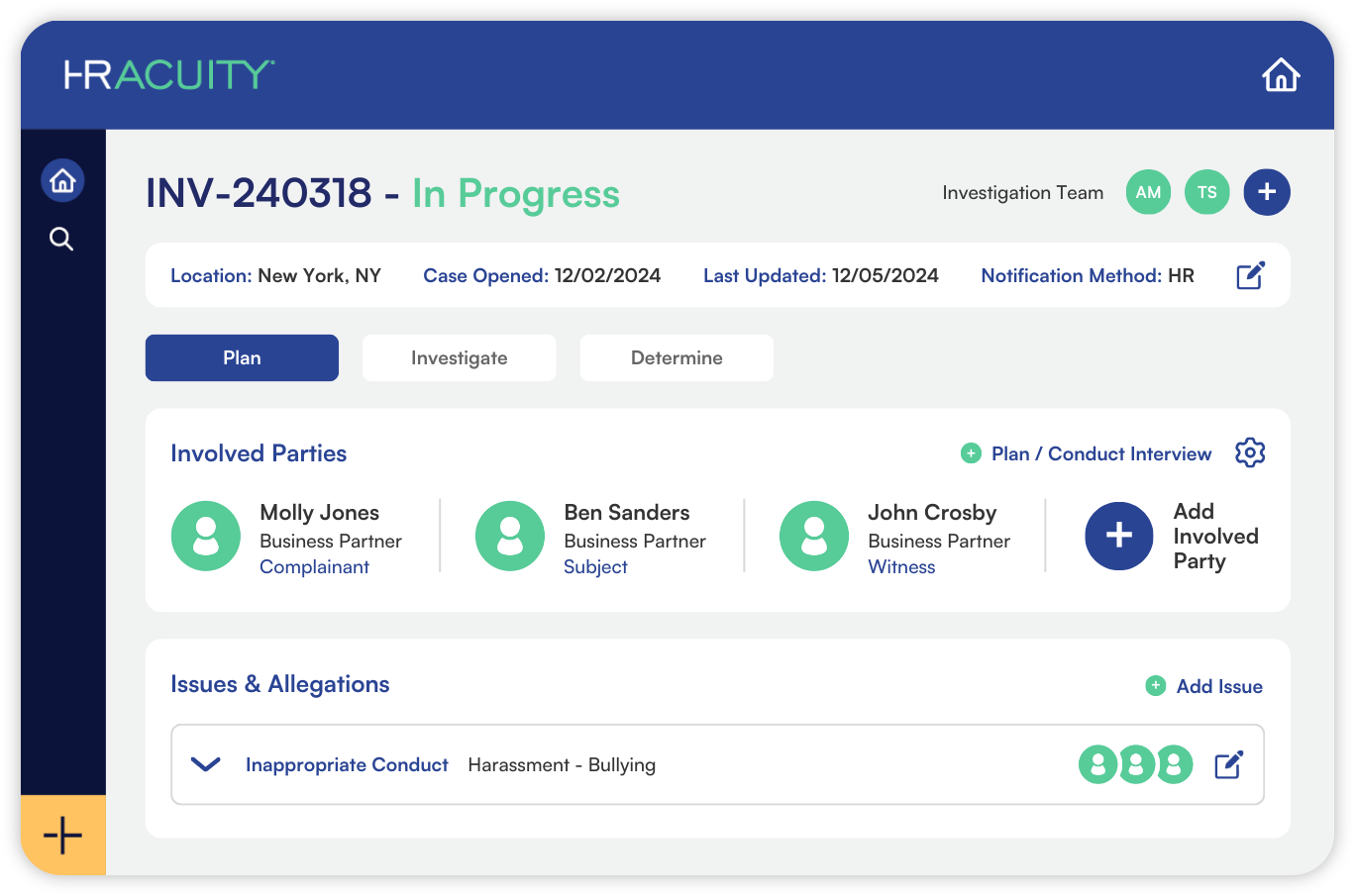Conducting a workplace investigation can be stressful for everyone involved — the complainant, the accused employee and the HR professional tasked with making sense of conflicting reports. That’s why it’s critical to ask the right questions during an employee investigation to ensure a fair, consistent and legally defensible process.
In this guide, we’ll walk through the top workplace investigation questions to ask complainants, witnesses and respondents — plus practical tips for running effective, compliant interviews from start to finish. Let’s dive in.

Key Takeaways: Questions to Ask During an Employee Investigation
- Asking clear, unbiased and open-ended questions when interviewing a complainant helps uncover who, what, where and when the alleged behavior occurred without leading the employee’s responses.
- A structured set of questions for complainants, witnesses and the accused supports fairness consistency and legal defensibility in workplace investigations.
- Handling interviews with care including choosing a private setting and being trauma-informed promotes trust with interviewees and reduces potential legal risk.
Workplace Investigation Questions for the Complainant
The questions you ask during an investigation interview can make or break the process. Avoiding leading questions or unintentionally putting words in the employee’s mouth is critical — and harder than it sounds. Missteps here can compromise the investigation from the start.
To help you set the right tone, here are 10 examples of strong, unbiased workplace investigation questions to ask when speaking with the employee who raised the concern:
- Who committed the alleged behavior?
- What happened?
- When did this occur? Is it ongoing?
- Where did this happen?
- Did you let the accused know that you were upset by this?
- Who else may have seen or heard this as a witness?
- Have you reported or discussed this with anyone? If so, who did you tell, when did you tell them and why?
- How has this affected you?
- Is there any electronic or physical evidence to document this occurrence?
- Do you have any other information that might be helpful to this investigation?

Questions to Ask Witnesses During a Workplace Investigation
Witness testimony that can be corroborated by multiple parties is more reliable to base a case on than the recollections of a single individual. The same principle applies to workplace investigations — with the added complexity that harassment or discrimination cases may hinge on perceived intent as well as actions.
Here are 15 workplace investigation questions to ask any witnesses as you work through the investigation:
- Can you recount your observations of the situation in question?
- Provide details on when and where the incident took place.
- Identify individuals present at the scene besides yourself.
- Did you overhear any conversations during the incident?
- Did any actions or behaviors strike you as particularly concerning or alarming?
- Did you notice anyone displaying signs of distress or discomfort during the incident?
- Have you observed similar behavior in the past?
- Were there any actions or behaviors leading up to the incident that you consider relevant?
- Describe any conversations or interactions you had with the involved parties before or after the incident.
- Are there other witnesses to the incident, and if so, can you share their contact information?
- Did anyone make comments that you perceived as discriminatory, harassing or retaliatory?
- Is there any additional information you believe is crucial for the investigator to be aware of?
- How did the incident make you feel based on your observations?
- Were you comfortable reporting what you witnessed to HR or your supervisor? If not, what hindered your comfort?
- Is there anything else you would like to contribute or clarify about your observations during the incident?
Remember: Consistency is key when it comes to interviewing witnesses. Ask each witness the same baseline questions. If a follow-up with one witness uncovers new information, it’s okay to go back to others and ask similar follow-ups — your goal is to be as thorough as possible.
Questions to Ask the Employee Accused of Misconduct
When interviewing employees accused of misconduct, it’s critical to tread lightly and avoid any appearance of a presumption of guilt. The accused employee may worry about their reputation, job security or legal ramifications. Your goal is to ensure they understand the allegations, have an opportunity to share their side of the story and feel that the process is respectful and impartial.
If possible, have two investigators present to prevent any accusations of impropriety and record the conversation for evidence (if legally permissible — some states require consent to record, so double-check before doing so).
Here are 10 recommended questions during workplace investigations when speaking to the respondent:
- Can you describe what happened, providing as many details as possible?
- What circumstances led up to the incident?
- What connection do you have with the person filing the complaint?
- Were any other individuals involved in said incident?
- Are there any witnesses or evidence that can support your account of the event?
- Have you spoken to anyone else about what happened, and what did you say to them?
- Are you aware of any other complaints made by the accuser?
- Can you recall the conversation you had with the accuser to the best of your ability?
- Can you think of any reason why someone would lie about this incident?
- Is there anyone else who might have knowledge of this incident whom we could interview?
Workplace investigation interviews, particularly when speaking to an employee accused of wrongdoing, can be challenging and sometimes a bit uncomfortable. It’s important to be prepared with investigation questions for the accused that both keep the interview fair and work to uncover the facts behind what happened. When executed correctly, an interview can be central to a comprehensive and compliant HR investigation process. Handling it poorly can expose your organization to additional legal risk — exactly what you want to avoid.
After the Investigation Interview: Next Steps for HR
You’ve completed the workplace investigation interviews. Now what?
For starters, it’s common to re-interview the respondent after your initial meeting to follow up on new details revealed by witnesses or document review. It’s not too late to get more information if you need it. Regardless, stay in touch with all parties. While you can’t share details about the investigation, letting employees know you are still actively working on the case signals a fair and thorough process.
Another pro tip: Don’t treat retaliation concerns as an afterthought. Review your anti-retaliation policy with involved parties and provide clear, actionable steps instructing them on how to report any retaliation incidents. After all, retaliation claims reached an all-time high in 2024, according to HR Acuity’s Ninth Annual Employee Relations Benchmark Study.

Workplace Investigation Interview Tips
Strong investigations start with strong interviews. How you frame questions, manage the conversation and document responses can determine whether your findings hold up — or fall apart. When handled poorly, interviews can even expose your organization to unnecessary legal risk, something every ER leader wants to avoid. Use these best-practice tips to guide your next investigation and keep the process fair, consistent and defensible.
Practice Trauma-Informed Investigations
Workplace investigations can be stressful or even retraumatizing for those involved. Be mindful of this and apply trauma-informed investigation principles to create a safe, supportive experience. Watch this quick video about trauma-informed investigations to learn more.
Be Mindful of the Setting
Choose a quiet, private location for your interviews — as we always say, never the breakroom. A comfortable, confidential setting helps participants feel safe sharing their perspective.
Remain Objective
Your role is to gather facts, not pass judgment. Maintain a neutral tone so participants feel comfortable being candid and providing complete information.
Come Prepared
Bring copies of all relevant policies or documentation. Preparation signals professionalism and builds trust, showing interviewees that you take the process seriously.
Pace the Questions Carefully
Start with easier, open-ended questions and save the tougher ones for the end. Once a participant feels defensive, their cooperation may drop. Make sure the accused is fully aware of the allegations and has the chance to respond.
Open the Floor to Interviewees
Before ending the interview, ask if there’s anything else they want to share. This gives them a final opportunity to provide information you may have missed.
Don’t Make Promises You Can’t Keep
Take concerns seriously but avoid promising a specific outcome at this stage. Doing so can damage trust if the result is different.
Keep Opinions to Yourself
Avoid sharing personal opinions about the complainant, accused, situation or claims. Maintaining neutrality reinforces fairness.
Be Respectful
Treat everyone involved with dignity. People are less likely to escalate or retaliate if they feel the process was handled fairly and all sides were heard.
Ask Witnesses the Same Questions
Consistency is critical. Ask each witness the same core questions. If new information surfaces, go back to other witnesses with follow-up questions as needed to keep the process balanced.
Remind Involved Parties Confidentiality Isn’t Always Feasible
Above all else, make sure you do not promise any measure of confidentiality, because it’s often necessary to bring in additional parties to resolve issues. While you can explain that privacy will be protected at every opportunity, it’s also important to note that it’s very rare to have an investigation where nobody outside the complainant and the investigator knows the details and parties involved.
Want to learn more about conducting fair, compliant workplace investigations? Check out How to Conduct Workplace Investigations for more information on best practices.
How HR Acuity Can Help Effectively Manage Workplace Investigations
Managing workplace investigations effectively requires consistency, thorough documentation and a structured approach — exactly what HR Acuity’s investigation management platform is built for. Rated #1 for Enterprise Investigation Management by G2 for Winter 2026, HR Acuity ensures every investigation follows a standardized, defensible process that reduces risk while promoting fairness and transparency.
Our platform goes a step further with AI-suggested interview questions tailored to the situation at hand, helping you conduct thorough, compliant interviews with best practices embedded right into the workflow. Combined with built-in templates, secure case tracking and data-driven insights, HR Acuity enables HR teams to confidently resolve issues and uncover trends that inform proactive solutions.
By equipping HR with the right tools and guidance, HR Acuity helps create a culture of accountability and trust. Ready to see how yourself? Get a demo today.




